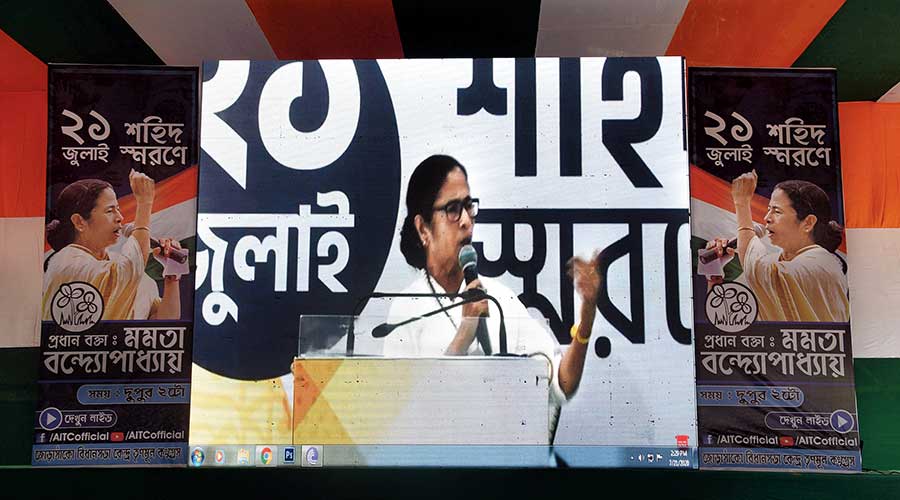Mamata Banerjee on Tuesday pitched next year’s Assembly elections as a battle for Bengal that must be fought against marauding “outsiders” and arrayed herself as a bulwark against “Gujarat” rule — a euphemism for the Narendra Modi-Amit Shah combine.
“Remember, Gujarat will not rule Bengal. Bengal will rule Bengal…. Gujarat will rule Uttar Pradesh, Bihar, Rajasthan, Tamil Nadu, Kerala, Odisha, Andhra Pradesh, Bengal, everywhere? Then what is the point of other political parties, of the Election Commission, the judiciary? One nation, one party?” Mamata asked while delivering an online speech to mark the most important event in the Trinamul Congress’s annual roster.
July 21 is observed by Trinamul as Shahid Divas (Martyrs’ Day) to commemorate 13 Youth Congress workers killed in police firing during a programme led by Mamata (then in the Congress) on that day in 1993.
Usually, a mega rally is held at Esplanade and Mamata addresses a gathering of lakhs to lay down the party’s political line for the rest of the year.
This time, her speech was aired live because of the Covid pandemic.
Mamata, who rued having to conduct the event this way, said she was able to reach over 50 lakh workers and leaders nonetheless with the speech beamed to booth-level venues across the state.
With less than a year left for the Assembly elections, Mamata took care to define the broad contours of the master plan for the next few months with the BJP singled out as her principal opponent, a foregone conclusion since the party’s spectacular performance in the Lok Sabha polls last year.
Vowing to conduct the biggest ever show on July 21 next year, after vanquishing the BJP and retaining power, Mamata said: “Hum hain na (I am here, don’t worry).”
Some of the thrust areas in her 70-minute address follow:
Identifying the enemy
Hardly spending any time on a work-in-progress Left-Congress alliance, Mamata mounted a ruthless attack on the BJP and repeatedly tried to underscore why the party is not a good alternative for Bengal.
Drawing attention to the BJP’s performance in the states it rules, Mamata said: “What is on in Uttar Pradesh? Jungle Raj would be a euphemism. Bonded labour. Police murdered. In the name of encounters, murderers of cops are also being murdered. Wiping out evidence. What government is this? Bihar, Karnataka, Assam, Tripura….”
“They only steal and call others thieves, then win elections using that money, having turned polls into a dirty game. Using money to buy votes,” she added.
Mamata attacked the BJP for trying to topple elected governments in other states and accused it of trying the same in Bengal.
“Trying to eliminate all other parties across the nation. Can you tell me why money will be used to fell the government in Madhya Pradesh? In Karnataka? In Rajasthan? In Bengal? This cannot go on,” she said.
Mamata sought to reinforce the traditional perception about the BJP in Bengal as a party of the “bohiragawto (outsider)” that stands for the RSS’s “Hindi, Hindu, Hindustan” vision, deemed alien to the state.
“The outsider will not run Bengal. Bengal will be run by the people of Bengal who love it,” she said.
The stress on “outsider” is being seen as an attempt — besides appealing to Bengali pride — to draw attention to a vacuum in the local BJP: no leader in Bengal can match her and the opponent will have to piggyback on Modi and Shah.
Citizenship reminder
Before the pandemic struck India, Mamata had been a spearhead in the anti-BJP narrative marked by the backlash against the new citizenship matrix that Shah and Modi have been trying to push through.
On Tuesday, Mamata indicated that not only had she not forgotten the issue but that she would keep revisiting it as a core theme for her campaign over the next few months.
“You don’t allow people to protest. Do not for a moment think that Covid-19 made us forget the citizenship matrix. We are all citizens here anyway. Who are you to come here and promise it anew?” she asked.
Both Union home minister Shah and BJP national president J.P. Nadda, in their virtual rallies for Bengal recently, had brought up the citizenship matrix in an apparent bid to build a polarisation-based campaign.
Mamata, by tossing her hat into the CAA-NRC-NPR ring, is seeking to address concerns articulated by Muslims and Gorkhas.
Wider reach-out: Mamata sought to expand her outreach exponentially, paying tributes to those killed during BJP rule in other states and the soldiers who lost their lives in the Galwan Valley.
“The tandav (rampage) across the nation, the lives it has taken, those martyrs too we remember today,” she said.
“The jawan brothers martyred on the India-China border. Those killed in the pandemic, fighting in the frontlines, the Covid warriors. Those killed by the apocalyptic Cyclone Amphan,” Mamata added.
The chief minister did not forget the victims of the Delhi riots in February. “How you butchered all those people in the heart of the national capital, then floated their bodies down gutters and threw them in ponds. People do not even know the actual death toll till date,” she said.
Promises for the next term: Asserting that she had delivered on development within “just a few years” in power (since 2011), Mamata showed no sign that she would deviate from dole politics and its successful execution.
“This might also happen, if our government stays, lifelong free rations, free health care, free education, free atmomorjada (dignity) and atmoshawmman (self respect) for Bengal,” Mamata said.
“We will earn from elsewhere, but everything will be distributed for the sake of the poor, for the masses…. Those helpless, those deprived, those neglected, those exploited, those oppressed, we must prioritise them,” said the chief minister, adding that employment generation for youths will also be her “foremost priority” in the next term.










